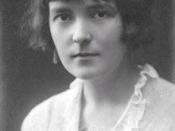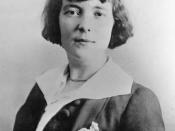In "A Cup of Tea", Katherine Mansfield presents us with Rosemary Fell. A wealthy, educated, socialite with a seemingly perfect life. But Rosemary Fell is a caricature, a two dimensional representation of a rich, self centered, shallow turn of the century English woman. A shining example of the selfishness, shallowness and affectation of certain types of fashionable women. Rosemary Fell is an easy target for criticism. But Rosemary Fell is no more or less flawed than any of us. She is a product of the society into which she was born and within which she moves. Behind the public facade she suffers her own insecurities. Rosemary Fell is a flawed individual, an insecure girl living in a sheltered world.
Katherine Mansfield introduces Rosemary Fell as an almost perfect character. She is wealthy, well read, traveled, fashionable, and clever. She is happily married with a "duck" of a son.
It seems that Katherine Mansfield has found in Rosemary Fell the perfect woman, except of course that "Rosemary Fell was not exactly beautiful." Mansfield's opening description of Rosemary Fell's perfect life is just enough to illicit a tinge of dislike from the reader. We are informed that Rosemary Fell is extravagant, and arrogant. She is accustomed to giving orders; to telling people what she wants "I want those and those and those. Give me four bunches of those. And that jar of roses." Before she has a chance we have already formed an opinion of this selfish, shallow and affected young lady.
But how could Rosemary Fell be anything other than she is? She is a reflection of the society in which she lives. She dresses fashionably because that is what is expected. She is expected to shop at the best retailers, from the most fashionable cities. She is expected...


